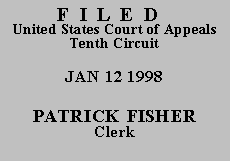

Defendant, Mr. Dwight Lee Anderson, appeals the denial of his motion for
a reduction in the term of his imprisonment.(1)
We exercise jurisdiction pursuant
to 28 U.S.C. § 1291 and affirm.
On May 14, 1992, Mr. Anderson pleaded guilty to possession with intent to
distribute crack cocaine in violation of 21 U.S.C. § 841(a)(1), and possession of
a firearm during and in relation to a drug trafficking offense in violation of 18
U.S.C. § 924(c). Mr. Anderson made his plea pursuant to Federal Rule of
Criminal Procedure 11(e)(1)(C). He and the federal government agreed to a
sentence of 135 months. The district court sentenced Mr. Anderson to the agreed
upon 135-month term.
Mr. Anderson pursued a direct appeal of his sentence. This court affirmed
his sentence on June 7, 1993. Several years later, on January 18, 1996, he filed a
"Motion to Vacate, Set Aside, Correct, Reconsider, Reverse and/or Reduce
Sentence Pursuant to 28 U.S.C. Section 2255, 18 U.S.C. Section 3553, and
Bailey v. United States" in the district court. The district court denied the motion
without providing Mr. Anderson an opportunity for an evidentiary hearing.
On appeal, Mr. Anderson challenges the district court's refusal to hold an
evidentiary hearing to determine if his sentence should be reduced. He contends
he is entitled to a reduction in his sentence because of a unique family situation
that takes him out of the "heartland" of the cases considered by the sentencing
guidelines.
When reviewing a denial of a § 2255 motion, we review the district court's
legal rulings de novo, and its findings of fact for clear error. See
United States v.
Cox, 83 F.3d 336, 338 (10th Cir. 1996). A district court need not provide an
evidentiary hearing when it is clear the defendant is not entitled to relief. See 28
U.S.C. § 2255; United States v. Marr, 856 F.2d 1471, 1472 (10th Cir. 1988).
The distinguishing feature of this appeal is that Mr. Anderson is asking the
district court to reduce his sentence several years after its original sentence
determination. Of critical importance to deciding if Mr. Anderson is entitled to
the relief he seeks is his failure to allege any impropriety or error in the original
sentence. This is not a collateral attack on the sentence originally imposed by the
district court, it is a request to revisit the sentencing determination based on
events that occurred after sentencing.
"A district court does not have inherent authority to modify a previously
imposed sentence; it may do so only pursuant to statutory authorization." United
States v. Mendoza, 118 F.3d 707, 709 (10th Cir.), cert. denied, 118 S. Ct. 393
(1997). Mr. Anderson offers 28 U.S.C. § 2255 as the statute authorizing the
district court to modify his sentence. That section, however, provides no such
authority in this case (and Mr. Anderson fails to cite any authority that supports
using § 2255 as he suggests). Section 2255 outlines the process whereby a
prisoner may "claim[] the right to be released upon the ground that the sentence
was imposed in violation of the Constitution or laws of the United States, or that
the court was without jurisdiction to impose such sentence, or that the sentence
was in excess of the maximum authorized by law." 28 U.S.C. § 2255. Mr.
Anderson alleges no such flaws in his sentence. He does not suggest his sentence
was improper; he merely requests that the district court take another look at his
situation. Therefore, § 2255 is inapplicable.
There is a specific statute permitting resentencing in the absence of error in
the original sentence, however, Mr. Anderson does not discuss it in his motion.
It states "[t]he court may not modify a term of imprisonment once it has been
imposed" except in certain extremely limited circumstances. 18 U.S.C. §
3582(c). Mr. Anderson's request does not fall within any of the categories
outlined by that section as proper reasons for resentencing.
For the foregoing reasons, Mr. Anderson's appeal fails and the district
court's decision is AFFIRMED.
Entered for the Court
WADE BRORBY
United States Circuit Judge
*. This order and judgment is not binding
precedent except under the
doctrines of law of the case, res judicata and collateral estoppel. The court
generally disfavors the citation of orders and judgments; nevertheless, an order
and judgment may be cited under the terms and conditions of 10th Cir. R. 36.3.
1. Because Mr. Anderson filed his §
2255 motion in the district court prior
to the effective date of the Antiterrorism and Effective Death Penalty Act of
1996, a certificate of appealability is not required. See United States v.
Kunzman, 125 F.3d 1363, 1364 n.2 (10th Cir. 1997).
UNITED STATES OF AMERICA,
Before BRORBY, EBEL and KELLY, Circuit
Judges.
After examining the briefs and appellate record, this panel has determined
unanimously that oral argument would not materially assist the determination of
this appeal. See Fed. R. App. P. 34(a); 10th Cir. R. 34.1.9. The case is therefore
ordered submitted without oral argument.
Click footnote number to return to corresponding location in the text.
![]() | Keyword |
Case |
Docket |
Date: Filed /
Added |
| Keyword |
Case |
Docket |
Date: Filed /
Added |
![]() (13586 bytes)
(13586 bytes)
![]() (10048 bytes)
(10048 bytes)
Comments to: WebMaster,
ca10 [at] washburnlaw.edu.
Updated: January 13, 1998.
HTML markup © 1998, Washburn University School of Law.
URL: http://ca10.washburnlaw.edu/cases/1998/01/96-1379.htm.